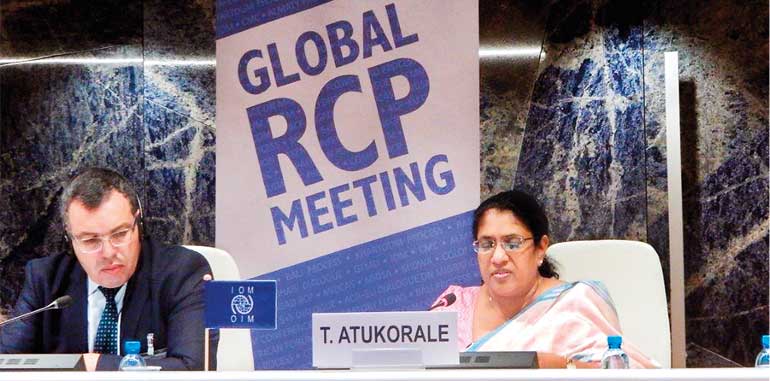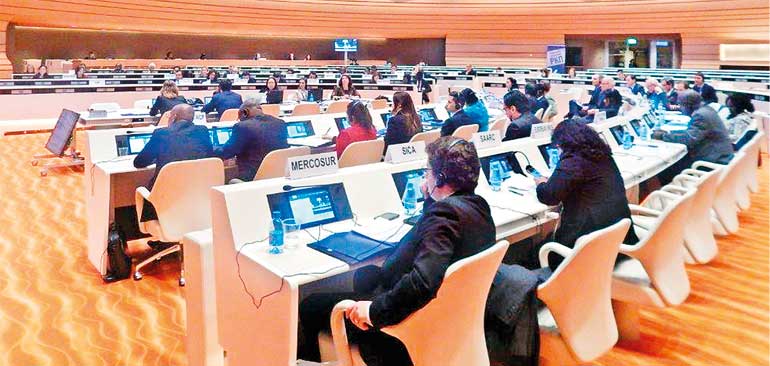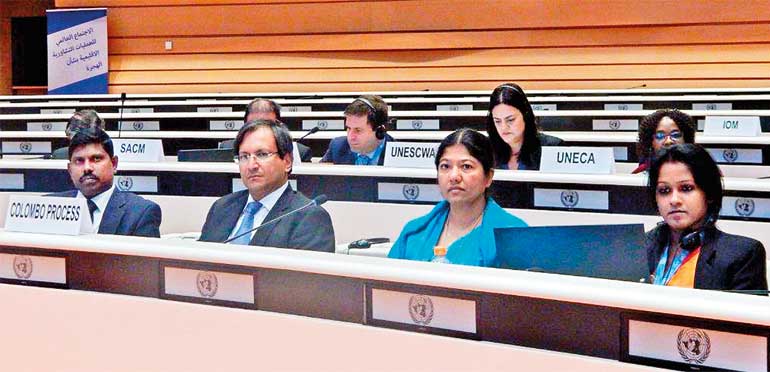Tuesday Feb 24, 2026
Tuesday Feb 24, 2026
Tuesday, 18 October 2016 00:08 - - {{hitsCtrl.values.hits}}
 Minister of Foreign Employment Thalatha Atukorale addressing the 6th Global Meeting of Chairs and Secretaries of Regional Consultative Processes on Migration
Minister of Foreign Employment Thalatha Atukorale addressing the 6th Global Meeting of Chairs and Secretaries of Regional Consultative Processes on Migration
Minister of Foreign Employment Thalatha Atukorale, who is also the Chair in Office of the Colombo Process (CP), the regional consultative forum of contractual labour originating countries in Asia, has said Sri Lanka is providing leadership for the CP to be a bridge between labour sending and receiving countries fostering strong partnership for the Asian region.
She said: “The CP will soon agree on the role it can play in supporting the overall implementation of the Sustainable Development Goals (SDGs) related to migration with a specific focus on contractual labour migrants, benefitting from the experience of having worked on issues such as ethical labour recruitment, migrant health and remittances over the past two years.”
The Minister said: “In the forthcoming negotiations on developing the ‘Global Compact on Migration by 2018’ the CP should be ready to engage constructively, building on the SDGs framework.”
The Minister made these observations when she addressed the 6th Global Meeting of Chairs and Secretaries of Regional Consultative Processes on Migration, held in Geneva on 13 October. The delegation to the Meeting included Sri Lanka’s Permanent Representative to the UN in Geneva Ravinatha Aryasinha, Deputy Permanent Representative Samantha Jayasuriya, Counsellor Shashika Somaratne, and Acting Deputy General Manager of the Foreign Employment Bureau D.G.G.S. Yapa.
Thank you for this opportunity to share with this important annual forum the experience of the ‘Colombo Process’ on the timely topic of implementing the 2030 Agenda: Opportunities and Challenges.
As we agreed to adopt and implement the 2030 Agenda containing 17 Sustainable Development Goals (SDGs) and 169 targets, we have unanimously embarked upon a process that is going to be universally applicable to all Nation States in the UN. Also, the inclusion of exclusive reference on Migration in the SDGs highlights its growing importance and interconnectedness to the Post 2015 Development Agenda.
TARGET 10.7 is the centrepiece of the Post-2015 Development Framework concerned with migration. It clearly envisages to “Facilitate orderly, safe, regular and responsible migration and mobility of people through the implementation of planned and well-managed migration policies”. At the same time, multiple dimensions of migration are also reflected in other SDGs, such as Education (Goal 4), Gender Equality (Goal 5), Employment and Decent Work (Goal 8), Peaceful and inclusive societies ( Goal 16) and also Global Partnership ( Goal 17), highlighting that migration is a complex, multi-disciplinary and multi-faceted issue.
The CP which is a voluntary regional consultative process for the contractual labour originating countries in Asia now comprises 12 countries namely Afghanistan, Bangladesh, Cambodia, China, India, Indonesia, Nepal, Pakistan, Philippines, Sri Lanka, Thailand and Vietnam. There is an estimated overseas worker population of 45 million of Asian origin which grows in numbers and diversity in terms of destination and source countries. Their contribution is increasingly being felt in their own countries, as well as regionally and internationally.
This morning, I wish to share with you three important points from the perspective of the Colombo Process, First, what we have been already doing and have achieved in migration management that has components related to the SDGs. Second, the new areas of cooperation which was agreed on at the 5th Ministerial Meeting held in August this year in Colombo bringing in the overarching theme of SDGs into the CP Agenda. Third, the opportunities generated within the CP to address our common challenges and how it has, and can work as a bridge to build effective partnerships to support the Members.
During the past three years of Sri Lanka’s Chairmanship under the overall theme of ‘Migration for Prosperity: Adding Value by Working Together’, CP has been focusing on five thematic areas – Qualification Recognition, Ethical Recruitment, Pre-departure Orientation, Promoting Cheaper, Faster and Safer Transfer of Remittances, and Tracking the Labour Market Trends and Research.
On 25 August, at the Fifth Ministerial Consultations of the Colombo Process (CP) held in Sri Lanka, the concluding ‘Colombo Declaration 2016’, among a number of new areas for cooperation, decided to explore cooperation in the operationalisation of the migration related goals in the SDGs in a holistic manner. It may be of relevance to mention here that although the CP decided to include an overarching new theme related to operationalising the migration related SDGs, we have nevertheless been working on some of the key components of the overall migration related SDGs through the ongoing five CP thematic areas that was just mentioned, for over two years.
For example, target 10.C on ‘ reducing to less than 3% the transaction costs of migrant remittances and eliminate remittances corridors with costs higher than 5% by 2030’, is an agenda already taken up for implementation in the CP thematic area related to ‘remittances’. While being mindful that remittances are necessarily privately-owned funds, the CP have encouraged its Member States to have in place remittance regulatory frameworks to facilitate and promote ‘cheaper, faster and safer transfer of remittances, so that our migrant labour forces will have greater choice and availability of regulated money transfer operators, and also more transparent information on transfer costs for them to choose the most cost-effective channels.
With these objectives in mind, we have launched a Thematic Area Working Group (TAWG) led by Pakistan, which met in August this year in Bangkok. We also aim at working on promoting the implementation of national-level policies that maximise the contribution of remittances to development through empowering migrant workers and their families on decision-making on financial management through financial education. The financial institutions engage with them to respond to their needs and we learn also from each other’s experiences and best practices.
Further, through the CP thematic areas of ‘fostering ethical labour recruitment’ led by Bangladesh, ‘skill and qualifications recognition’ steered by Sri Lanka and the ‘effective pre-departure orientation and empowering’ by the Philippines, we envisaged to put in place tangible actions to lay the ground work to realise well-managed migration polices in our countries. These efforts go in tandem with the SDG targets 10.7 and 8.8, in particular relating to decent work and safe migration. We do so both through national-level actions and the collective efforts of the CP, by using the CP as a platform to share experiences and address challenges, while noting that the primary responsibility in prioritising policy decisions and the implementation of these goals and targets lies with the individual Member States.

The ‘Colombo Declaration 2016’ also saw the inclusion of ‘Migrant Health’ as a new thematic priority, considering the importance of promoting the health of migrant workers throughout the migration cycle to reduce long term economic and social cost, although some aspects of it has already been dealt under the thematic area of ‘Pre Departure Orientation (PDO). This initiative will have a bearing on the SDG target 3.8 on achieving universal health coverage including ‘access to safe, effective, quality and affordable essential medicines, vaccines and health-care’, since without including migrants in such an endeavour, who are identified as a vulnerable group, it would not be possible to universalise the Goal on health.
Gender equality for women migrant workers, which links to SDG 5, to promote the development of gender specific actions for women migrant workers is another new area that the CP has agreed to embark upon, to prevent any discrimination that the female migrant labourers from CP Member States may face.
The CP will continue to target tangible deliverables based on the experience that the CP Member States have gathered by implementing the MDGs, so that we will not be starting from scratch. I believe that this understanding is well demonstrated by the fact that several CP Member States that have achieved advanced status or have prioritised in their national policies the areas in the five thematic areas, namely Bangladesh, the Philippines, Thailand, Sri Lanka and Pakistan have volunteered to steer in these areas, where other Members have contributed actively as participating expert members.
As stated before, the CP while focusing on the ongoing five thematic areas, are also engaged in a process of understanding the role it can play as a Regional CP in supporting the overall implementation of the SDGs related to migration with a specific focus on contractual labour migrants. The CP will soon agree on exact ways and means of operationalising the new areas and will also be engaging in consultations including with the relevant Agencies such as IOM, ILO, UNWOMEN, WHO, etc. for their technical support as related, and also the civil society participants as agreed by CP Member States.
Without prejudice to the exact contours of our future action plans, in my national capacity I believe that CP could begin it by taking stock on already achieved progress. This can be in the form of a mapping exercise in our capacity to deliver by using the research work and the data already gathered in the area of SDGs by diverse sources. While on the one hand we will not be reinventing the wheel but building upon the existing strengths, we will be providing sufficient knowledge to each individual Member State to adjust their policy space on migration related SDGs to suit the national priorities. This will give an initial indication to individual Member States of the comparative strengths and lacunas they have, in reaching the global SDG indicators that have now been developed by the UN, to serve as a global common denominator.
We can consider undertaking a feasibility study to decide the levels that are achievable in the short, mid and long terms within our region – Asia, on the specific indicators related to migration and match the national efforts with the global levels to the best extent possible. I would reckon that we must have sufficient flexibility to decide on what our immediate priorities are at national level as all our actions are based on consensus.
By doing so, the CP can become a voluntary forum to share best practices, understand challenges and to review progress made in implementing the above SDG targets. We are conscious that there will be no one-size-fits-all model in realising the SDGs. Although the issues may appear to be common, we face a varying degree of challenges in addressing them. We therefore need novel ways of working.
Policy and institutional coherence is of great importance. The critical capacity gaps in CP such as financial constraints and training opportunities to improve human resources, inadequacy of disaggregated data on human mobility, coordinated institutional responses and transparent information sharing mechanisms, monitoring mechanisms at local levels are some of the common challenges where partnerships could help. In meeting these challenges the CP has benefited from several effective partnerships established in the past.
Strengthening further ‘means of implementation’, in line with Goal 17 of the SDG is crucial. We must also identify means of linking up our priorities with potential donors and partners so that there is mutual interest to work together, while helping the CP Member-States in capacity building.
It is in this spirit that the labour sending countries in Asia will continue dialogue with the destination countries and other dialogue forums including Abu Dhabi Dialogue (ADD), EU, SAARC, ASEAN, GFMD etc. to share information and to discuss respective roles in implementation of migration related SDG targets. Further, I believe that in the forthcoming negotiations on developing the ‘Global Compact on Migration by 2018,’ we should be ready to engage constructively building on the SDGs framework. The Colombo Process seeks to be a bridge between labour sending and receiving countries fostering strong partnership for the Asian region in making migration an informed option for its peoples.
